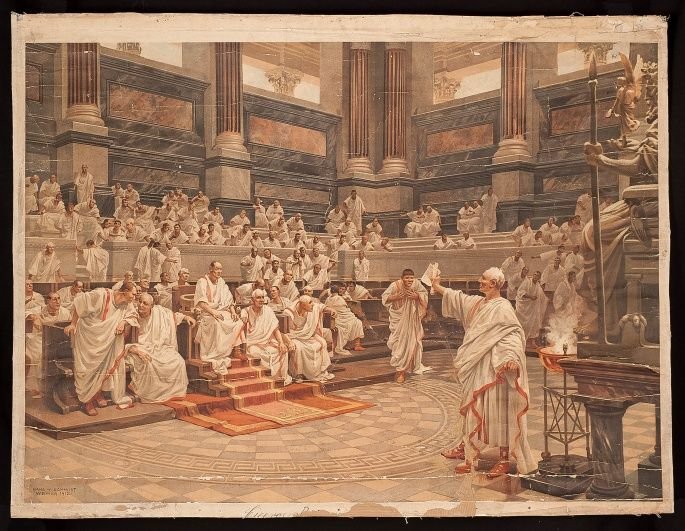On January 10, 49 B.C. Caesar knowingly broke the rules by crossing the Rubicon river and plunged Rome into civil war. Mass panic ensued as Pompey, most of the Senate, and most other optimate fled the city. The fear was that if Caesar reached Rome, he would slaughter all of his enemies. However that was not at all what he did. Once he pacified the city, he established himself as ruler of Rome. He then began hunting down Pompey, who reached Egypt before being killed by the locals. Caesar was not too happy about this and punished those involved.

Taking Control
After seven months in Egypt doing some conquering and lovemaking with Cleopatra, he returned to Rome. He took control of the government and essentially set himself up as dictator, like Lucius Sulla. By doing this, he's in a position where he tells everyone what will happen, and his commands become implemented.
When he returned, no one knew what to expect, although many Senators anticipated their demise. However Caesar did not arrive and create a massacre, again like Sulla. He left the Senate where it was, instead of dismantling it, and forgave his political rivals. Therefore the Senate was still there and Senators continued to meet. In response to his actions, Caesar was given many honors:
- Renamed July for him
- Gave him a gilded chair
- Also a purple and gold robe
- In 44 B.C. the Senate named him dictator perpetuas; dictator for life
As dictator he actually managed to take care of a lot of the problems that existed before his rule, and was the first real reformer who was effective. He:
- Granted citizenship to loyal provincial communities in Italy
- Ended the practice of Tax Farming in the provinces; substituting it with a fairer system of taxation
- Set up new colonies so that veterans would have land, which lowered the cost of the dole
- Also gave grain to the poor, but reduced the number of families that needed it
How the Mighty Have Fallen
Caesar took all kinds of measures to clean up government, and one of the problems by the late Republic was with the court system. Like any court, they were supposed to judge on the merits of the evidence on the case. However, by this point there was a lot of bribery, and so cases were being decided on who had more wealth.

Among other things, he also changed the calendar and was kind to his enemies. Yet under Caesar, only he was making the decisions and the Senate was not being consulted, instead being told exactly what was to take place. He was distorting the Republic by running the government in this manner. So on March 15, 44 B.C. his dictatorship was put to an end.
Caesar was on his way to meet the Senate when, at the foot of Pompey's statue, he was stabbed 23 times by Senators. One young Senator came up to him with a petition for him to read. As he was doing so, he was attacked by the others. There are many accounts of what exactly occurred that day, but there is one that I prefer. While Caesar was fighting them off, he looked up to see Brutus, one of his loyal allies. Once he realized that even he was in on this, it was truly over. Therefore, the source claimed that he lifted his toga up over his head and just let them stab him.
Was He Good or Bad?
The conspirators argued that he had to be killed in order to save the Republic, and if he survived the Republic would die. With Caesar in power the Republic was not working how it was designed to, and if he continued the people would forget how to govern themselves through laws. One other thing he ended were the civil wars caused by people struggling for power, but with him dead and power removed from the Senate, there was no process to replace him. However, if Caesar never took on the problems he did, Rome would have disintegrated a lot sooner than it did.

Julius Caesar became the Roman nightmare: a demagogue with extralegal power who could sway the public. Yet the ordinary public was livid when news spread of his death. They wanted to kill those that killed him. Once you have someone like Caesar you have no other options besides killing him, or all out war. In his will, which was read at the forum, he left a sum of money to every citizen, and left his gardens open to the public.
What the Senators tried to prevent came about anyway in the person of Caesar Augustus.
Which I planned to talk about in a post soon about Augustus.
What a nice history lesson about a great and controversial ruler.
Having a master's degree in law, I'm particularly fascinated with the laws of that time and especially the great story of Cicero's biggest trial :)
Thank you for reading! :)
Great posts man, keep it up!
Thanks so much!
Congratulations @vestabesta! You have completed some achievement on Steemit and have been rewarded with new badge(s) :
Click on any badge to view your own Board of Honor on SteemitBoard.
For more information about SteemitBoard, click here
If you no longer want to receive notifications, reply to this comment with the word
STOP